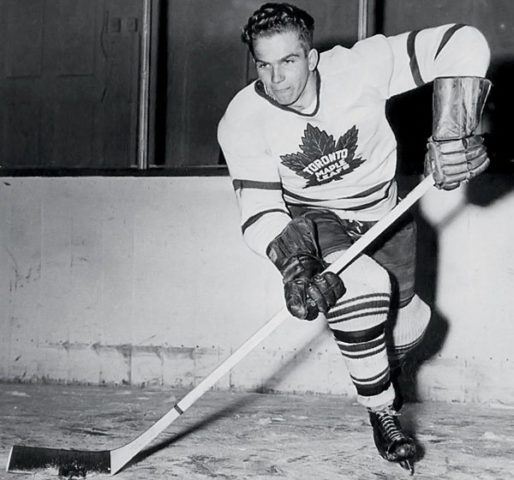On April 21, 1951, Game 5 of the Stanley Cup Final between the Toronto Maple Leafs and their bitter Original Six rival the Montreal Canadiens had gone into overtime. Then-Maple Leafs defenseman Bill Barilko skated down the ice and suddenly dove headfirst towards the Canadiens’ net. As he did, he fired a backhander towards goalie Gerry McNeil.
The startled goalie never had a chance: Barilko’s shot went behind him and the Maple Leafs won the 1951 Stanley Cup. For 14,577 Maple Leafs fans who attended the game, watching that Stanley Cup-winning goal was unforgettable.
Many Maple Leafs fans have since called it the most famous goal in Maple Leafs history. Teammates lifted Barilko onto their shoulders and fans flooded the ice. It was his fourth Stanley Cup victory in his five seasons with the team. It was also his last.

On a hunting and fishing trip to northern Ontario, Barilko’s plane disappeared into the deep bush. Eleven years later, the plane and two skeletons were discovered partially submerged under swampy water.
How Did Barilko Come to the Maple Leafs?
In July 1945, the Maple Leafs got a letter from scout Ernie Orlando about two brothers he had discovered playing for the Porcupine Combines – a junior team in northern Ontario. These brothers were Bill and Alex Barilko. As Orlando’s letter noted, the brothers were both “husky lads.”
Orlando encouraged the brothers to consider the Maple Leafs organization, and they did. Brother Alex never made it to the NHL, and played senior-level hockey, later becoming an AHL referee.
Related: Gord Downie, Hockey, and The Tragically Hip
On the other hand, “Bashin’ Bill” (a nickname given because of his daring lifestyle and on-ice personality) became a key defenseman on the Maple Leafs and played there from 1946 to 1951. He never was much of a scorer and had only 62 points in five seasons with the team; however, many of his goals – he was a specialist on slap shots – seemed to be scored at crucial times.
Because the pay wasn’t great in the NHL in those seasons, as well as playing for the Maple Leafs, Bill spent the off-season running a small appliance store in Toronto. In the summer he engaged in his passions – hunting and fishing.
In his last contract with the team, Barilko made $9,000. He would have made $500 more if he made the second NHL All-Star team and $1,000 if he had been named to the first NHL All-Star team. But he didn’t.
The Disappearance of the Barilko Flight
Four months after his game-winning Stanley Cup-goal, Barilko simply vanished. In August 1951, when visiting his family in Timmins, he accepted the last-minute invitation by his friend, the local dentist Henry Hudson, to fly with him to Rupert House on James Bay in northern Quebec on his first-ever fishing adventure.
When Barilko’s mother Fay learned his trip would start on Friday, Aug. 24, she pleaded with him not to go “to that wild bush country.” She later reported, “I had a premonition something would happen.” (from “The 11-year mystery of Leafs’ ‘Bashin’ Bill Barilko’,” Carola Vyhnak, The Star, 06/01/17).
Related: What Mats Sundin Meant to Toronto Hockey
His mother was worried because Barliko’s father (her husband) had died on a Friday five years earlier and she didn’t want her son to “take a chance on anything on Friday,” she said. “I told him I would rather die than see him take this trip.”
The young Barilko shrugged her off and made his mother so angry she refused to kiss him goodbye. The two would-be fishermen were last seen refueling their plane at Rupert House late Sunday afternoon: then they disappeared.
The Most Expensive Air Rescue in Canadian History
When the two didn’t return, the Royal Canadian Air Force quickly organized a search that included dozens of planes and more than 150 searchers. At first, northern pilots weren’t worried because Hudson was an experienced pilot who’d taken many flights into the James Bay area on hunting and fishing trips. He knew the bush well.
You may also like:
- Maple Leafs Should Keep Murray as Third Goaltender
- Flames & Maple Leafs Trade History Revisited
- 3 Players the Maple Leafs Could Target on a PTO
- NHL Rumors: Oilers, Maple Leafs, Capitals, Kuznetsov News
- Maple Leafs Should Target Evgeny Kuznetsov as Reclamation Project
However, they searched for two months and covered more than 78,000 square kilometers at an altitude of 500 feet. As the leader of the rescue mission noted, it was like “practically looking under every twig.”
After more than two months of searching and no sign of the missing plane, the search was called off. The total cost of the search was $385,000 (about $3.7 million in today’s dollars), which made it the costliest air rescue search in Canadian military history.
In 1962, Barilko’s plane was found only 75 miles from his home when a helicopter pilot spotted glinting metal among thick black spruce trees. On June 6, searchers dug their way through two kilometers of dense bush to find the plane.

Besides the two skeletons were the remains of fish that they had caught and stored in a smashed pontoon. During the crash, both the plane’s wings were sheared off. The skeletons were still strapped in seatbelts. It was obvious the two men had been killed on impact. Barilko was 24 at the time of his death.
The Lasting Memory of Barilko’s Stanley Cup Goal
The Barilko family erected a tombstone in Timmins, Ontario, in 1960. On the tombstone are pictures of Barilko in a Maple Leafs’ uniform. Barilko’s 1951 Stanley Cup-winning goal has become one of the greatest and most memorable goals of Maple Leafs’ history. In 2002, The Star named it one of the top-10 sporting moments that fans would never forget.
Related: Remembering Borje Salming: “King” of Maple Leafs’ Defensemen
In 1993, Canadian rock band The Tragically Hip released a second single from their third full-length album Fully Completely. The song, titled “Fifty Mission Cap” was a tribute to Barilko and reintroduced his story to generations of Canadians who hadn’t heard about him. It turned out to be one of the Tragically Hip’s most popular songs.
Bill Barilko is remembered well by Maple Leafs fans and the organization. Until 2016, only two of the team’s members had their jersey numbers retired. One was Ace Bailey (who played with the team from 1926-33) and the other was Barilko (1946-51).
